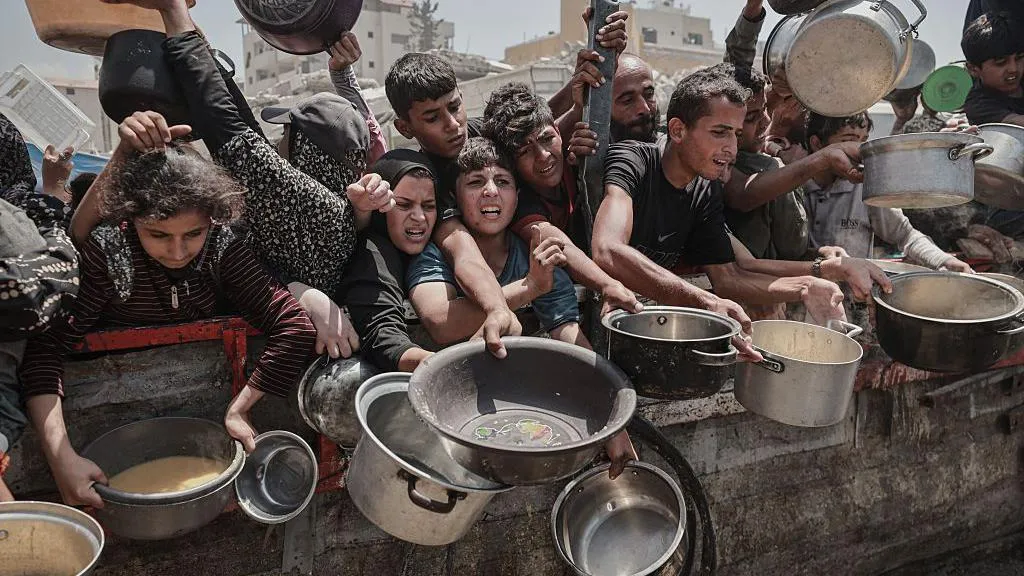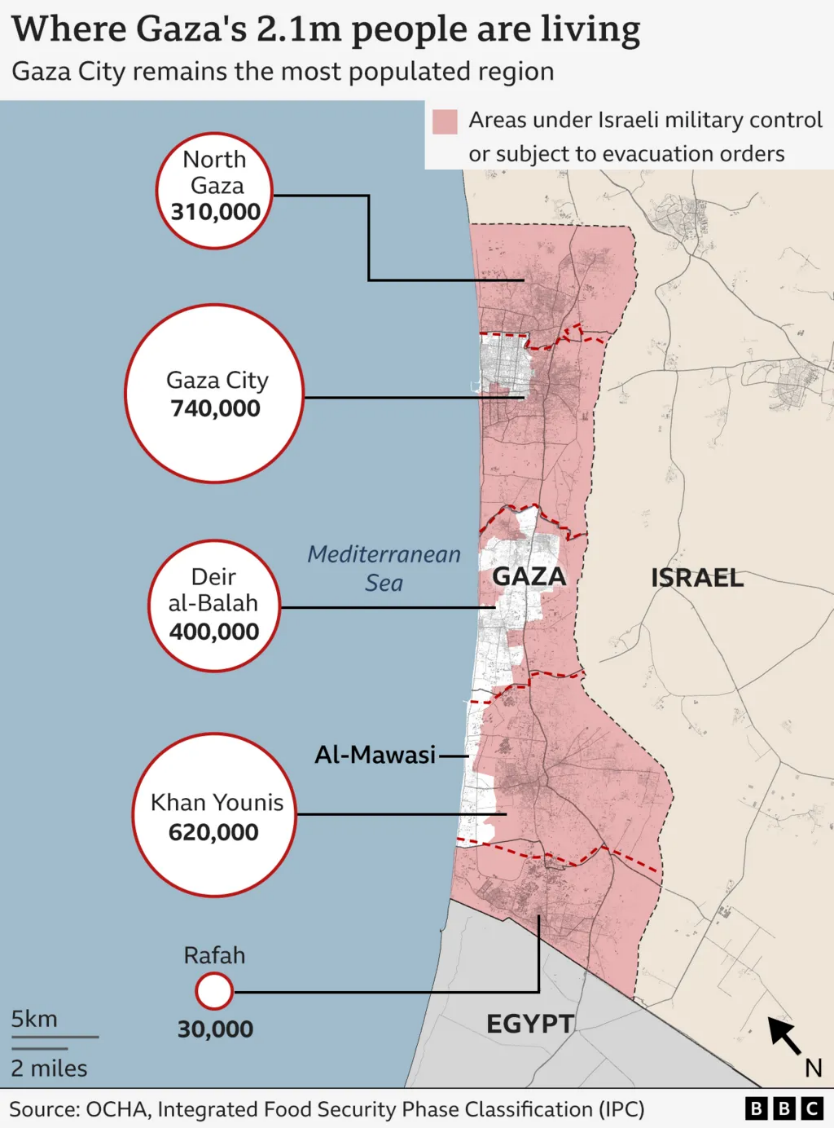By Dimitris Kouvaras,
Almost two years have passed since Hama’s surprise attack of October 7th, 2023, which signalled the beginning of the ongoing brutal conflict in the Gaza Strip and Israel’s fierce military reaction. These painful years have witnessed the development of one of the most pressing humanitarian crises of the 21st century, as the 2.1 million inhabitants of Gaza have faced increasing food scarcities, lack of medical supplies, destruction of houses and welfare infrastructure, and constant exposure to deadly fire. Meanwhile, the conflict gradually acquired the traits of a genocide, as global consensus and the UN belatedly acknowledged, given that more than 61.000 Palestinians have perished. Unfortunately, even though one would think that the toll has been too high to sustain, either for Israel or for Hamas itself, carnage has not stopped.

On the contrary, Israel recently announced yet another escalation in the war by introducing plans to take over Gaza City, the largest urban centre of the Strip that serves as its capital and the seat of the Hamas government, with more than 700.000 inhabitants. Although around 86% of Gaza is already under IDF control or evacuation orders according to UN estimates, this proposed operation signals a tipping point in the entire crisis. Given its potentially far-reaching -and destructive- consequences, it is worth examining the rationale behind it, Israel’s plausible expectations, what they mean for the conflict, as well as how the international response to the situation might affect future developments.
To understand Israel’s logic behind the decision to capture Gaza City, let’s first have a look at its strategic objectives in the conflict. Military involvement in Gaza was justified by the October attacks and the capture of Israeli hostages by Hamas, which is seen by Israel as a terrorist organisation, not least due to its origins in the first Intifada, its rejection of the Israeli state, its approval of violence and its militant character. As the organisation is perceived as an existential threat by Netanyahu’s government, the main objective of operations in Gaza was, from the outset, the destruction of Hamas and the release of hostages, which also led to the killings of Hamas’ leaders outside the strip, such as Ismail Haniyeh in Tehran. As for now, none of these objectives has been fulfilled despite the assassination of most Hamas senior officials and the unthinkable Palestinian civilian casualties that resulted from the onslaught. Hamas keeps fighting, and its terms for hostage release include an end to the war, unrestricted access to humanitarian aid, and a postwar role for the organisation in Gaza.
Netanyahu’s existentially perceived obsession with annihilating Hamas might therefore explain why Israel is stepping up its military grip in Gaza. The Israeli government’s black-and-white perception of the conflict and its absurd expectation of total victory seem to push plans of more direct control. At the same time, the upcoming second anniversary of the conflict provides a great propaganda opportunity for a decisive blow on what is perceived as the enemy’s stronghold that would upturn the balance of power to an extent that might cause impressions of an impending ending to the conflict, appeasing those in Israel who have grown critical of its continuation and crediting Netanyahu with a war achievement. One could also argue that the operation is intended to increase Israel’s leverage in future negotiations and help it extract harsher terms from Hamas, but I think it’s the wrong way of putting it. What is more likely is that an occupation of Gaza City, if attempted and successful, will become the prelude to complete IDF control over Gaza. Even if Hamas releases the remaining hostages as a result of the operation, it is unlikely to self-dissolve, therefore granting military operations a reason to continue. Since negotiations only happen when there’s something to negotiate with, if all of Gaza were taken over, they would be nothing but a farce.

Meanwhile, the process of capturing Gaza City would mean an escalation of genocidal violence and an exacerbation of already alarming starvation in the area, not to speak of mass displacement. An internal regime change favourable to Israel would be an unlikely outcome, given that it could be perceived as capitulation against a violent state whose threat to Palestine is existential, and most importantly, because a population on the brink of physical and medical collapse is not fit to rebel against a militant force such as Hamas. Even if Israel tries to establish its own puppet government, the maintenance of the occupation will meet with resistance and come with a high logistical, manpower and economic cost.
Therefore, the single most likely outcome of this strategic decision remains that of more death and hunger for the Palestinian inhabitants. As for the conflict, it seems prone to continue without a foreseeable end other than a problematic and uncertain Gaza capture, unless a policy shift happens within Israel itself. Noticeably, the recent decision caused debate between Netanyahu and the IDF’s military chiefs, who blocked an extension of the proposed operations beyond Gaza City. Even as considerations are logistical and not ethical, there could be a potential that an escalation will make more officials conscious of the absurdity of the policy on Gaza.
As for the international community, its opposition stiffens, but for now doesn’t affect Israel strategically. However, developments are underway, such as the proposed recognition of Palestine as a state by France and the United Kingdom in September, or the ban on arms exports to Israel from Germany for use in Gaza. Given that toleration is globally wearing off, it is on the international stage rather than inside Gaza that a military success would provide Israel with diplomatic leverage in potential negotiations, giving it an upper hand. After all, no enforcement mechanisms exist to make it back down. Only a serious US intervention would be impactful enough, yet Donald Trump and the State Department are assuming the role of Pilatus, washing their hands off. Until actions that are currently taking shape also take effect, the international community will likely remain no more than an observer.
As a result, if the operation to take over Gaza City takes place, yet another humanitarian crisis will follow. Strategic notwithstanding, the operation is unlikely to lead to an end of the conflict or a fulfilment of Israel’s excessive expectations. Instead, it will aggravate the carnage and the bitterness of a war that is depriving the members of the Palestinian nation of their collective and individual rights.
References
- Germany suspends arms exports to Israel for use in Gaza. Deutsche Welle. Available here
- What we know about Israel’s plan to take over Gaza City. BBC. Available here
- Israel’s gamble in Gaza City signals a push toward negotiation—but risks a long insurgency. The Atlantic Council. Available here




